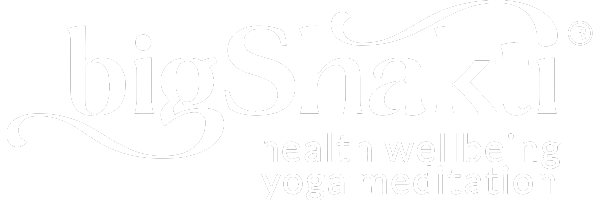INTRODUCTORY COURSE
Yoga Psychology & Yoga Psychotherapy
The science of the embodied relationship between consciousness and mind.
FOR PRACTITIONERS & INDIVIDUALS
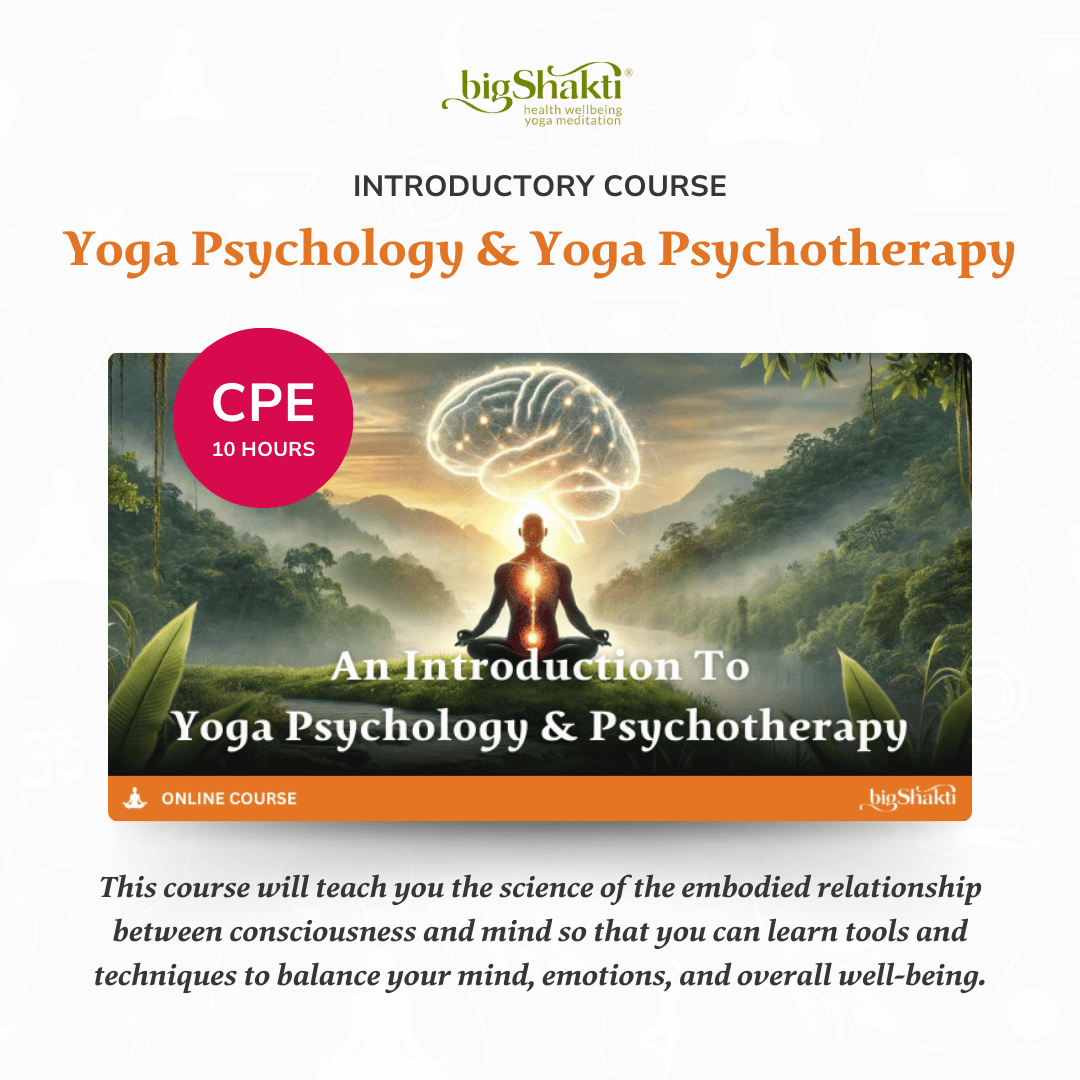
Online Course Components
- Self-paced on-demand training
- 2 Core Training Modules
- 18 Lessons (Video & Written Theory)
- 2 Guided Meditations
- 11 Integration Exercises
- Email Support from Teachers
🎓 Earns 8 CPD points with Yoga Alliance USA, Yoga Australia, & SYTA. CPD Certificate provided upon completion.
Cost: USD$97
INSTANT ACCESS 🕉️ SELF-PACED 🕉️ EMAIL SUPPORT
"I think this course is brilliant. The depth of knowledge, both of traditional yoga and Western studies of the mind, is obvious. The wisdom is combined with tools that help us delve more deeply and have greater understanding. A wonderful understanding of the facets of mind, and how to use that knowledge to access the higher states."
Yoga Psychology and Yoga Psychotherapy are vast and integral branches of Yoga Therapy.
The transformative potential of yoga psychotherapy is immense. It transforms the mind from a weak, confused, battered, fractured, and bruised state into something diamond-hard and diamond-bright. This transformation enables immense creativity and a deep connection to meaning and purpose.
Yoga psychology and psychotherapy are based on self-awareness and knowledge of the “subtle body,” the invisible energies sandwiched between the physical body and spirit. Yoga psychology and psychotherapy play a vital role in successfully managing physical, psychological, and spiritual conditions. They view illness as a sacred path to higher awareness.
Combined with Western psychotherapeutic approaches, yoga psychology creates a powerful holistic approach for healing and spiritual awakening.
ABOUT YOUR INSTRUCTOR
Dr. Swami Shankardev Saraswati
Dr. Swami Shankardev Saraswati is a pioneer in the field of Yoga Therapy. His journey began with a spiritual awakening at age 13 when he was introduced to the concept of the Third Eye. Today, he is a multifaceted expert: a Yoga Acharya (master yoga teacher), a medical doctor, and a psychotherapist.
He created this course to offer a comprehensive overview of the Indian philosophies of Yoga, Samkhya, and Tantra, which form the foundation for yoga psychology and psychotherapy.
His unique blend of expertise provides students with both theoretical knowledge and meditations from these ancient wisdom traditions and their modern applications.
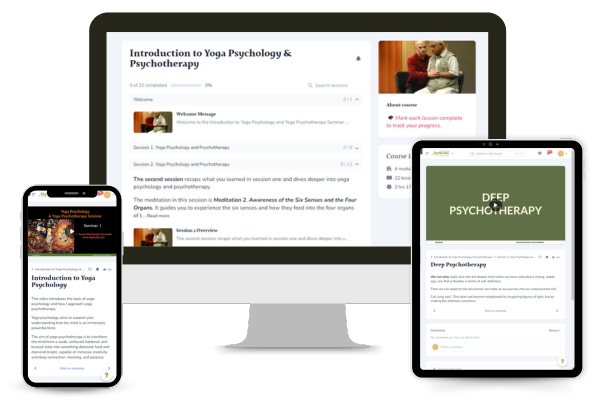
This comprehensive course is designed to be practical, combining theoretical knowledge with practical meditation techniques. This approach enables you to deeply understand and effectively integrate these ancient wisdom traditions into your daily life. Through a balanced approach of study and practice, you'll gain insights that can be readily applied to enhance your personal growth and well-being.
The meditations in this seminar series enable you to tune into the subtle forces operating in the body and mind. Awareness of these forces initiates a process of purification and healing that leads to greater health, strength, and inner illumination.
“I think this course is brilliant. The depth of knowledge, both of traditional yoga and Western studies yof the mind, is obvious. The wisdom is then combined with tools that help us delve more deeply and have greater understanding. A wonderful understanding of the facets of mind, and how to use that knowledge to access the higher states. ”
Sakshi Winning
Australia
“We were delighted to welcome Dr. Swami Shankardev Saraswati to present on Yoga Psychology and Yoga Psychotherapy at the Australian Yoga Therapy Conference. He is one of Australia's most experienced and acclaimed Yoga experts. The audience was deeply grateful for the wisdom and deep knowledge he shared with them. Swami Shankardev is a highly engaging and inspiring speaker and I would highly recommend you take advantage of his online seminars.”
Trina Bawden-Smith
Sydney Australia
“Yoga psychology is the science of the embodied relationship between consciousness and mind. Yoga psychology describes how the idealized healthy body and mind function and how imbalances can occur leading to pathology. Yoga psychotherapy shows us how to restore balance, enlighten the mind and find lasting purpose and meaning”
Dr Swami Shankardev
What is Yoga Psychology?
Yoga Psychology is the application of yogic principles and practices to understand and improve mental and emotional well-being. It integrates traditional yoga philosophy with modern psychological concepts to explore the mind-body connection, self-awareness, and personal growth.
Central to Yoga Psychology are concepts such as:
- the three gunas (sattva, rajas, tamas)
- the chakras (energy centres)
- the four organs of the mind (manas, buddhi, chitta, ahamkara)
Yoga Psychology uses various yogic techniques like meditation, pranayama (breath control), asanas (postures), and mindfulness to achieve mental clarity and emotional balance.
The primary goal of Yoga Psychology is to facilitate holistic healing and personal growth by integrating the body, mind, and spirit. It aims to promote self-awareness, emotional balance, and overall well-being through the application of yogic principles and practices.
What is Yoga Psychotherapy?
Yoga Psychotherapy aims to address mental health issues and emotional distress by using a holistic approach that includes body, mind, and spirit.
It combines the therapeutic aspects of yoga with psychological counselling and therapy. This therapy involves personalised sessions that incorporate yoga practices such as:
- asanas
- pranayama
- meditation
- traditional psychotherapeutic techniques
The goal of yoga psychotherapy is to create a deeper awareness of oneself, facilitate healing, and promote mental health and well-being.
What You Learn In This Introductory Course
- Yoga Psychotherapy as a holistic science.
- The 4 main yoga philosophies that form the foundation of Yoga Psychology.
- An outline of the structure of the mind and the forces that animate the mind.
- The relationship between mind and consciousness.
- What is the subtle body.
- The Sanskrit terms for western concepts, such as the “inner parent, adult, child”.
- How to support your “inner child” by developing a wise and enlightened inner adult.
- How to improve your relationship with self and others.
- How to transform suffering and adversity to actualize a conscious relationship with the vast cosmic forces that lie beyond socially conditioned awareness.
- Gain information about your individual karma so that you can begin to see your unique life purpose and destiny from a higher perspective.
- An overview of the techniques and the path to liberate yourself from old destructive patterns and to create new creative patterns in your mind and your life.
- How to heal and enlighten the mind.
Why It's Beneficial to Learn About Yoga Psychology for Yourself
When the world around you feels chaotic and stressful, understanding the intricacies of your mind and emotions is more important than ever. Yoga psychology offers a profound and holistic approach to mental and emotional well-being that goes beyond conventional methods.
The principles of yoga psychology are not just theoretical; they are practical and can be integrated into your daily life. Whether you're dealing with stress at work, navigating personal challenges, or seeking to enhance your overall well-being, the tools and techniques of yoga psychology are applicable and effective in everyday situations.
Here's why learning about yoga psychology can be incredibly beneficial for you:
Holistic Healing
Yoga psychology integrates the wisdom of ancient yogic traditions with modern psychological concepts, providing a comprehensive approach to healing. This holistic perspective addresses not just the symptoms but the root causes of mental and emotional distress, leading to deeper and more lasting healing.
Enhanced Self-Awareness
At the heart of yoga psychology is the practice of self-awareness. By learning to tune into your thoughts, emotions, and subtle body energies, you gain valuable insights into your inner world. This heightened self-awareness helps you recognize and understand patterns that may be contributing to stress, anxiety, or other mental health issues.
Emotional Balance
Yoga psychology teaches techniques to cultivate emotional balance and resilience. Practices such as meditation, pranayama (breath control), and mindfulness help you manage your emotions more effectively, reducing reactivity and promoting a calm and centered state of mind.
Personal Growth
Engaging with yoga psychology encourages personal growth and transformation. It provides tools to navigate life's challenges with grace and strength, helping you turn adversity into opportunities for growth. By integrating the lessons of yoga psychology, you can develop a stronger, more resilient mind capable of immense creativity and purpose.
Spiritual Connection
Yoga psychology bridges the gap between the physical, mental, and spiritual aspects of your being. It fosters a deeper connection with your true self and the universe, offering a path to spiritual awakening. This sense of connection can bring profound meaning and purpose to your life.
Improved Relationships
By understanding your inner world, you can improve your relationships with others. Yoga psychology provides insights into the dynamics of your interactions, helping you cultivate healthier, more fulfilling relationships. It teaches you how to support your inner child, develop a wise and enlightened inner adult, and improve your communication and empathy skills.
“Loved the course. It was very informative and well presented. I gained a lot of knowledge about the yogic philosophy of the 4 organs of the mind and how to identify and work with them.”
Simone Adams
high school teacher and yoga teacher
“I really love the way you combine meditation, psychology, and spiritual concepts in such a user-friendly, manageable format. I am calmer, less reactive, more creative, and productive despite life constantly hurling bombs at me. I am grateful for your guidance. Not many Yoga teachers have the experience to guide me in this way. I feel connected and trusting of you because you have shown me how to trust and connect with myself in a most real and wonderful way.”
Belinda Robson
“I was inspired to take this course To deepen my knowledge of yoga psychology and help my clients heal by becoming more aware of their innate abilities. The course developed my interest in the deeper aspects of both the Gunas and the Koshas as related to the mind. I look forward to more of your courses in the future.”
Sharron Williams
Yoga Therapist, Australia
“What I enjoy about Big Shakti online courses and meditations is their combination of wisdom and practice. They have helped to clarify my understanding of certain yogic terms in the light of modern Western psychology, and thus allowed my practice to become alive, useful and meaningful. As a teacher, I am better able to explain the science behind the techniques, which my very Western students appreciate. There is an urgent need for yogic mind management in today's society. Once known these techniques can be practiced by everybody no matter what challenge they may be facing from depression to the constant mind chatter. Big Shakti's courses offer a bridge that Westerners can cross trustingly.”
Laure Carter
Yoga Teacher & Ayurvedic Lifestyle Consultant, Florida, United States
“The Yoga Psychology Course is beautifully presented and crafted to make the concepts understandable and attainable. I have gained a new understanding of how manas, chitta, and buddhi react and respond to the gunas and how these effects interweave with our chakras and mental health. The timing of each lesson, along with the beautifully crafted visuals are perfect for my learning style. It helped to repeat the study several times to fully understand, digest, and embody the course content in my own life. Thank you both”
Annette Loudon
yoga therapist/teacher/researcher
Online Course Components
- Self-paced on-demand training
- 2 Core Training Modules
- 18 Lessons (Video & Written Theory)
- 2 Guided Meditations
- 11 Integration Exercises
- Email Support from Teachers
🎓 Earns 8 CPD points with Yoga Alliance USA, Yoga Australia, & SYTA. CPD Certificate provided upon completion.
INSTANT ACCESS 🕉️ SELF-PACED 🕉️ EMAIL SUPPORT
Our Accreditations
Big Shakti’s courses are recognized by the Yoga Alliance (USA) as Continuing Education (contact hours), Yoga Australia, Satyananda Yoga Academy, and SYTA (Satyananda Yoga Teachers Association) for Continuing Professional Development.

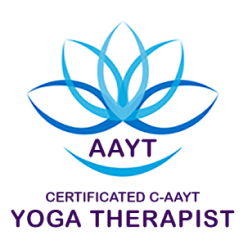

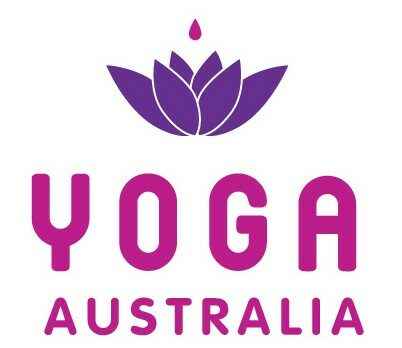
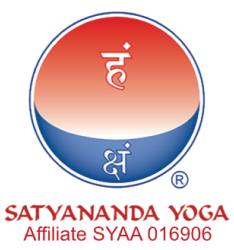
Introduction to Yoga Psychology & Psychotherapy
Introduction to Yoga Psychology & Psychotherapy
Course FAQ
Course FAQ
If you have more questions about this course, contact us anytime.
Yes, this introductory course is designed for beginners. It provides a comprehensive overview of yoga psychology and psychotherapy, starting with basic concepts and gradually building up to more advanced ideas. The course includes clear instructions, practical meditations, and theoretical knowledge to help you understand and integrate these practices, even if you have no prior experience.
Experienced yoga practitioners will find this course enriching as it delves into the intersection of traditional yoga practices and modern psychotherapy. It offers advanced insights into the structure of the mind, the relationship between mind and consciousness, and techniques for healing and enlightenment. This knowledge can enhance your existing practice and provide a deeper understanding of yoga’s therapeutic potential.
This course aims to transform the mind from a weak and confused state to one that is resilient and bright. You will learn techniques to improve self-awareness, manage stress, support your inner child, and develop healthier relationships with yourself and others. The course also teaches how to transform suffering into personal growth and achieve a deeper connection with cosmic forces.
The course consists of 2 modules with a total of 18 lessons, including both video and written theory. It also includes 2 guided meditations and offers email support from teachers. Upon completion, you will earn 8 Continuing Professional Development (CPD) points and receive a CPD certificate. This structure ensures a balanced approach to both study and practice.
Yoga psychotherapy combines the therapeutic aspects of yoga with psychological counseling and other Eastern and Western psychotherapy systems. It incorporates yoga practices such as asanas, pranayama, and meditation alongside traditional psychotherapeutic techniques. This holistic approach addresses mental health issues by integrating body, mind, and spirit, promoting a deeper awareness of oneself, and facilitating healing and personal growth.
This course provides practical tools and techniques that you can easily incorporate into your daily routine. Through guided meditations and theoretical knowledge, you will learn how to use yoga psychology to improve mental clarity, emotional balance, and overall well-being. The course teaches you how to create a healing meditation ritual, support your inner child, and develop a conscious relationship with the deeper aspects of yourself.
SELF-PACED ONLINE COURSE
SELF-PACED ONLINE COURSE

Introduction to Yoga Psychology & Yoga Psychotherapy
Tools and techniques to balance your mind, emotions, and overall well-being.
Enrol in our Yoga Psychology and Yoga Psychotherapy introductory course and discover the incredible benefits of this ancient wisdom combined with modern therapeutic practices.
Your journey to self-awareness and holistic healing begins here.
Introduction to Yoga Psychology & Yoga Psychotherapy
Tools and techniques to balance your mind, emotions, and overall well-being.
Enrol in our Yoga Psychology and Yoga Psychotherapy introductory course and discover the incredible benefits of this ancient wisdom combined with modern therapeutic practices.
Your journey to self-awareness and holistic healing begins here.

